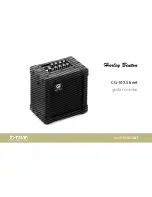
COMPRESSION
The COMPRESSION control sets the intensity of compression. Turning the control clockwise
increases compression. The working area spans between 0 dB (fully left) and -32 dB (fully
right).
The compressor applies the so-called “soft-knee” characteristic, which means it starts
processing earlier than with hard-knee curve (see page 26, diagram 1, curve B). Hard-knee
compressors can sometimes gain more loudness, but they process abruptly and the danger
to ruin a recording with compression artifacts is much higher. On the other hand the soft-
knee compressor always helps very well to keep levels under control and ensures highest
recording safety – and if there is a desire to gain further loudness, the signal can still be
processed after recording.
At maximal compression it operates with a ratio of 1:2.5 between input and output signal –
very effective dynamic processings are achievable with unobtrusive sound characteristics.
The exact development of the compressor curve is portrayed in the diagram 1 on page 26.
When setting the COMPRESSION rate the GAIN REDUCT. display in the display area is of
great assistance. The effect on the selected COMPRESSION rate is scaled in 1.5 dB steps.
Depending on signal source and dynamic structure the reduction values should lie between
4 and 8 dB to restrict higher peaks and to optimize the operation of the subsequent recording
system.
MAKE UP GAIN
With the MAKE UP GAIN control you can restore the overall level reduction caused by
compression or limiting. With assistance of the GAIN REDUCT. display setting the MAKE UP
GAIN control is very easy: If the maximal reduction value caused by the loudest tone amounts
to -9 dB, for instance, the MAKE UP GAIN control is also to be set to the value +9 dB. If the
compressor/limiter is now switched off the achieved gain in loudness will be audible.
NOISE GATE
The NOISE GATE control reduces soft disturbances during signal pauses. When turned fully
counter clockwise the noise gate is switched off. By turning the control in a clockwise direc-
tion the threshold value increases. This means that the noise gate closes relatively earlier.
The processing span of the NOISE GATE control is between -100 dB/OFF (gate control turned
fully counter clockwise) and + 15 dB (gate control turned fully clockwise). The noise gate is
therefore operable over the complete dynamic range.
The noise gate functions very stably: the point at which it opens lies 6 dB above the point at
which it closes again (hysteresis of 6 dB). Definite closure and opening is therefore assured
– the most feared characteristic of “fluttering” is excluded. Even critical signals are cleanly
processed.
The noise gate’s release time is set automatically. The automation, which depends upon
the program, adjusts itself to the musical piece, thereby ensuring optimal (undetectable)
opening and closing.
15
Channel One
Compressor
Control Elements
















































